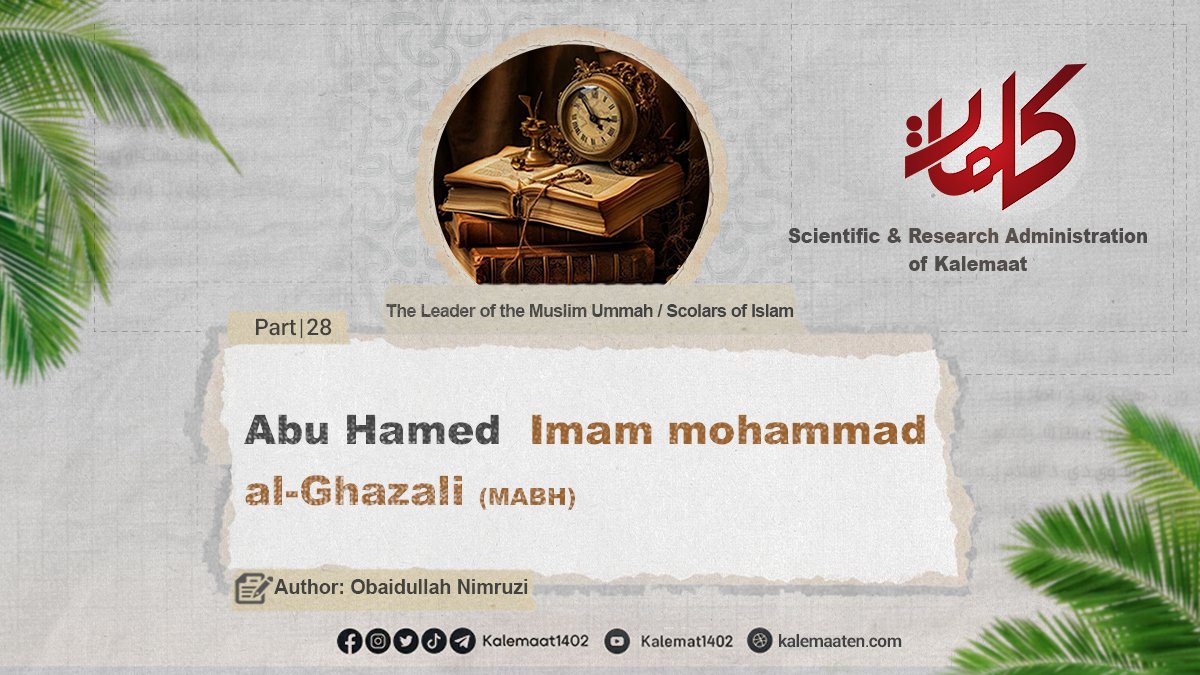
Author: Obaidullah Nimruzi
The Biography of Abu Hamed Imam Muhammad al-Ghazali [MABH] (Part 28)
Imam al-Ghazali: Theology, Intellectual Transformation, and Lasting Impact
Keywords: Ghazali, Kalam, Yaqeen, Mu’tazila, Influence, Sincerity
Abstract:
Imam Muhammad ibn Muhammad al-Ghazali al-Tusi (MABH) was among the greatest thinkers and theologians of the Islamic world, who left a profound impact across various sciences—from jurisprudence and principles of law to philosophy, Sufism, and theology. He lived in an era marked by intense intellectual and doctrinal conflicts within the Islamic world. On one hand, philosophical discussions influenced by Greek thought posed serious challenges to religious beliefs; on the other, theological currents and various Islamic schools each tried to present their own beliefs as absolute truth. Amid this turmoil, Imam al-Ghazali, with his scholarly insight, rational strength, and deep perspective, managed to chart a new path in theology and reform Islamic thought.
In the previous section, we examined Ihya’ ‘Ulum al-Din, one of Imam al-Ghazali’s most significant reformative and educational works. This book was an attempt to restore the genuine spirit of Islamic teachings and correct widespread mistaken beliefs. In continuation, this section explores Imam al-Ghazali’s status in the field of theology (kalam), his spiritual crisis and withdrawal from teaching, his eventual return to education, and his lasting impact on the Islamic world.
Imam al-Ghazali and His Position in Theology:
The science of theology (kalam), defined as the discipline of defending Islamic beliefs against doubts and opposing ideologies, had reached a critical juncture during Imam al-Ghazali’s time. On one hand, philosophical schools influenced by Greek thought—such as Aristotelian and Neoplatonic philosophies—attempted to explain religious matters purely through logic. On the other, groups like the Mu‘tazilah adopted an extreme rationalist approach that often-contradicted divine texts.
Imam al-Ghazali, who had first achieved high expertise in rational and philosophical sciences, critically examined these topics. In his book Tahafut al-Falasifah (The Incoherence of the Philosophers), he specifically critiqued the views of the Peripatetic philosophers and demonstrated that many of their claims were incompatible with the revealed teachings of Islam. He particularly rejected the philosophers’ positions on three issues: the eternity of the world, God’s knowledge of particulars, and bodily resurrection. He emphasized that reason alone cannot grasp all metaphysical truths and is in need of guidance from revelation. Thus, Imam al-Ghazali is considered one of the most important revivers of theology who, through a balanced approach between reason and revelation, strengthened this discipline and made it resilient in the face of contemporary intellectual challenges.
The People’s Persistent Requests and Imam al-Ghazali’s Refusal to Teach:
In his youth, Imam al-Ghazali quickly advanced in Islamic sciences and became a professor at the Nizamiyyah School in Baghdad, one of the most prestigious institutions of the time. With his exceptional scholarly abilities, he attracted many students and taught jurisprudence, theology, and logic. However, he soon underwent a spiritual crisis and felt that fame and academic rank were diverting him from sincerity in religion and spiritual growth. This crisis, which he thoroughly described in his book al-Munqidh min al-Dalal (Deliverance from Error), led him to suddenly abandon teaching and embark on long travels.
After his withdrawal, people, students, and even rulers repeatedly urged him to return to teaching. But he, always committed to sincerity in action, did not accept their requests until he reached full internal certainty. After years of spiritual refinement and deep religious contemplation, he eventually returned to teaching—not for fame, but to reform the community and guide the people.
The Final Years and Passing of Imam al-Ghazali:
After many years of teaching and writing important scholarly works, Imam al-Ghazali once again decided to retreat from academic disputes and returned to his hometown of Tus. During these years, he continued to educate students and author valuable books. He no longer sought fame or academic positions; rather, his only aim was to purify the religion and explain the truth to the people. Finally, in the year 505 AH, while still engaged in teaching and contemplation, he passed away.
Two Distinct Qualities of Imam al-Ghazali: Sincerity and High Aspiration:
Imam al-Ghazali was among those rare personalities who maintained sincerity in all his actions throughout his life. At the peak of his scholarly fame, he abandoned it without hesitation and pursued true certainty and knowledge. He never sought public attention or social status. Even when he returned to teaching, his only goal was guidance.
Moreover, his lofty ambition and tireless pursuit of knowledge led him to attain mastery in various fields such as jurisprudence, theology, philosophy, and Sufism. He never settled for limited knowledge and was always in search of truth. Even in the final years of his life, he continued to read, think, and write.
Imam al-Ghazali’s Influence on the Islamic World:
The influence of Imam al-Ghazali on Islamic thought is vast and enduring. By combining philosophical insight with religious understanding, he opened a new path in theology and epistemology. Many later scholars, including Fakhr al-Din al-Razi and Ibn Taymiyyah, benefited from his ideas. His works even reached Europe, influencing thinkers such as Thomas Aquinas.
In the realm of moral education, with his composition of Ihya’ ‘Ulum al-Din, he carried out a fundamental reform of Sufism and Islamic ethics. He critiqued extremism in mysticism and strove to cleanse it of heretical innovations, placing it on the path of the Qur’an and Sunnah. In jurisprudence, as one of the foremost Shafi‘i jurists, he played a key role in the development of legal theory, and his works are still studied by Islamic scholars today.
Conclusion:
Imam al-Ghazali was an unparalleled example of a scholar who created a unique balance between reason and revelation, philosophy and religion, mysticism and jurisprudence. Not only in his own time, but throughout all later eras, he left a lasting mark on Islamic thought. His intellectual and moral character became a model for future generations, and his works remain alive and widely used in various Islamic sciences.
Continues…


